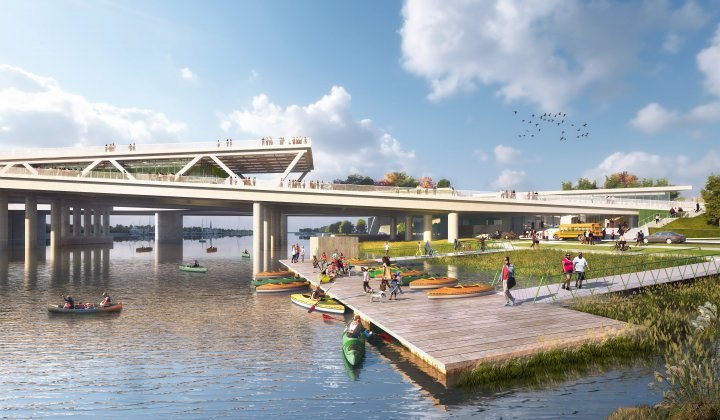Cape Town-based smart logistics company Pargo has found a way to effectively get orders to customers. Its click-and-collect model comes to life through its partnerships with retailers in various communities around the country. You click to choose where you want to receive your purchases, Pargo delivers to the location, and you collect at your own convenience.
When smart logistics company Parcels On The Go, better known as Pargo, started operating in 2015, its founders Lars Veul and Derk Hoekert wanted to create a national network of tech-enabled pickup points where customers could fetch their online purchases. Their vision was to establish an online shopping delivery hub that could compete with the South African postal service ‒ while also creating a completely new lane in e-commerce.
Veul and Hoekert went into business fully aware that they were entering an extremely competitive environment. Their service had to offer something unique and better than all available options. As luck would have it for the pair, who hail from the Netherlands, when they finally started operating, the South African Post Office was imploding and struggling to remain competitive. In the 2015-2016 financial year, the SAPO was operating amid financial constraints, poor operating efficiency and increasingly struggling to evolve in response to growing competition in the mail, e-commerce and courier sectors.
“The retail shopping environment was changing, and it just so happened that when we launched Pargo, there was industrial action at the Post Office that was disrupting services. So that really worked in our favour and set us on the right course,” says Hoekert.
Pargo’s other potential competitors ‒ online retailers and courier companies ‒ were struggling to get purchases into the hands of their customers. For what is known as the last mile in the delivery service, or getting the product to the buyer, the high cost of delivery per order and other social challenges were posing risks to courier businesses and online retailers.
“When a courier makes delivery, they cannot just leave it on your doorstep. So we partnered with thousands of local stores, from filling stations to corner shops, and the most established retailers. We use those stores as parcel drop-off and pickup points. We allow people to buy online and instead of getting a delivery at their homes, they get to pick it up at one of those stores. They have a week to collect their parcel,” says Veul, the other half of the Pargo duo.
Eight years later, Pargo has created a massive network ‒ 3 000 and growing ‒ of tech-enabled retail pickup points around the country. A growing number of online retailers offer their customers the option of choosing Pargo on the checkout page. Once they have selected this option, customers simply have to click on the map before them and choose their preferred pickup point. Customers get to track the movement of their parcels and receive delivery notifications via SMS and email.
Pargo’s growth has taken place at a time when the national retail culture is gravitating towards online shopping. Veul and Hoekert have also learnt that online shoppers, just like those who still prefer to make purchases at bricks-and-mortar shops, expect a great shopping experience that is convenient, offers competitive pricing and, most importantly, great service.
In the beginning…
Before their foray into entrepreneurship, Veul and Hoekert were employees of American e-commerce giant Groupon. Groupon is an online marketplace that connects subscribers with merchants. On this platform subscribers can shop for activities, travel, goods and services. In 2012, the e-commerce platform was expanding operations to Africa and deployed Veul and Hoekert to head this up. When the eventual business partners arrived in Cape Town, they soon realised the enormous potential for e-commerce growth in Africa.
Here, they discovered that one of the impediments to e-commerce was logistics. Although the industry was thriving, there was growing demand for a well-functioning distribution system. To be able to trade effectively, Veul and Hoekert had to formulate a solid, convenient delivery service. They explored the idea of providing such a service themselves and subsequently became participants in the e-commerce playground.
They have since partnered with everyone from big name retailers to small corner shops and filling stations in major urban areas and remote rural communities in order to set up pickup points.
With this business offering, Veul and Hoekert ultimately want to make e-commerce accessible to everyone in South Africa and beyond.
“What has been the biggest catalyst of our growth is that a big part of the population in South Africa lives in areas that are not easy to deliver to, where the cost is very high ‒ typically your township areas and small rural towns. In those scenarios people use our service for cost and accessibility reasons,” explains Veul.
Online retail growth in South Africa
Online retail culture in South Africa has accelerated since the pandemic in 2020, resulting in the proliferation of online businesses and more online retail offerings from traditional retailers. One of the most appealing factors of e-commerce is that one does not need a bricks-and-mortar store in order to operate. Traditional players in the retail space have had to pivot and keep up with the changing culture.
A study conducted by World Wide Worx in partnership with MasterCard called Online Retail in South Africa 2022 found the total growth for online retail in South Africa in 2022 was 30%, catapulting total online retail sales in the country to R55 billion. In 2021, online retail growth generated R42.3 billion.
The report found online shopping was more prevalent during hard lockdown, when physical movement and shopping was limited. As a result, consumers who were not always open to the idea of shopping online came on board, while those who were already shopping online sustained this practice.
The study does, however, note that consumer demands and expectations of online retailers have grown as well, with the discerning buyer seeking improved services. The result is that growth in online retail comes not from increasing demand, but also from consumers shifting existing purchase behaviour from physical shops to (and among) online stores and apps.
Pargo’s click-and-collect service solves the challenges of last-mile distribution. It helps reduce delivery costs through consolidated deliveries to its 3 000 pickup points around South Africa. In this setup, couriers are not travelling further distances to make deliveries, reducing the company’s carbon footprint considerably – something that appeals to sustainability-conscious younger consumers.
In the future
Veul says the company’s plan in the medium to long term is to expand operations to other parts of the Southern African bloc. He does, however, caution against aggressively pursuing growth at the expense of slowly establishing a solid network of pickup points and responding to the business needs of the country of operations.
Hoekert notes that a large part of the population in sub-Saharan Africa live and work in areas that have limited access to goods and services. “These areas include informal settlements and rural areas, which often lack proper residential addresses and are challenging and expensive to service by courier,” he explains.
But remote communities are not the only ones grappling with limited access. In urban areas, access to customers living in high-security housing estates, large office buildings and universities poses a challenge, adding to the cost of ensuring delivery by courier.
Busy people may also not have someone at home to send or receive parcels on their behalf, leading to missed deliveries and disappointment. Pargo’s listed pickup points are located in easy-to-find stores, buildings, businesses and areas, meaning all citizens can benefit from online shopping no matter where they live.
Although the majority of Pargo’s customers pay using online payment methods, the company is also looking at ways to accommodate cash payments. Veul notes that in some communities people still prefer to make their transactions using cash due to long-standing and growing scepticism around online transactions.
KEY TAKEAWAYS:
- Bulk orders reduce the cost of delivery per order.
- A solid logistics plan is key in ensuring effective delivery.
- Pickup points allow for customers in remote areas also to deliver and receive parcels.





